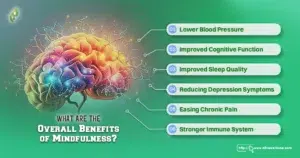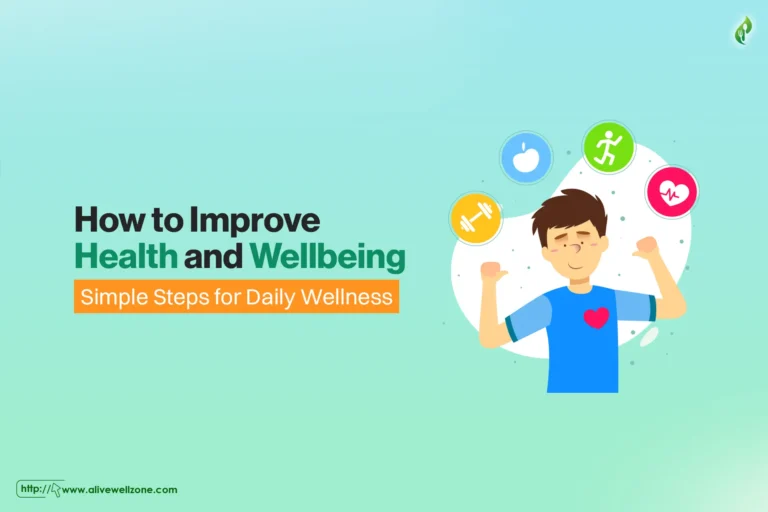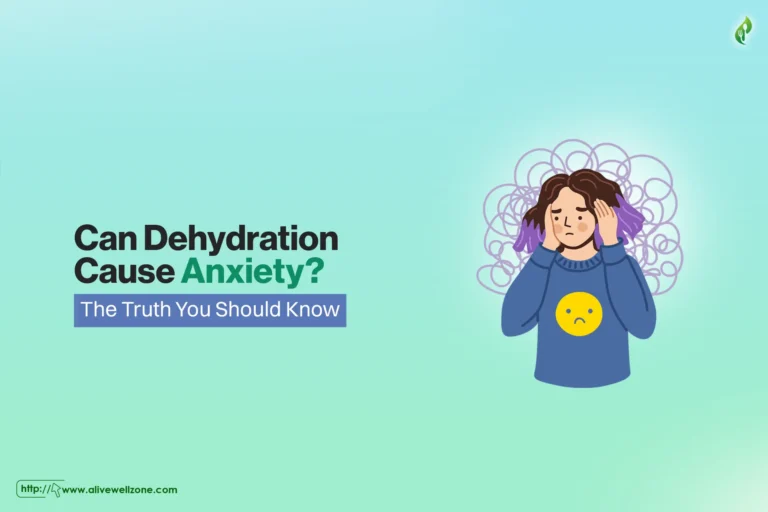
Last Updated on December 5, 2024 by Helena Akter
Feeling stressed, anxious, or unable to concentrate? It has been shown that mindfulness, which focuses on the present moment without judgment, has a great deal of physical and mental benefits. Nowadays, taking time for mindfulness is more important than ever.
Recent brain studies show that mindfulness can actually change the brain’s structure and how it works. It’s also linked to less stress, better sleep, sharper focus, lower blood pressure, and other health improvements.
We’ll look at the science of mindfulness and its health benefits next. Being present in the moment can help you rewire your brain for happiness, calm, and overall well-being.
How does Mindfulness Work?
Some experts believe that mindfulness works, in part, by helping people to accept their experiences—including painful emotions—rather than react to them with aversion and avoidance.
It’s become increasingly common for mindfulness meditation to be combined with psychotherapy, especially cognitive behavioral therapy. This makes sense, as both meditation and cognitive behavioral therapy share the same goal: helping people challenge negative thought patterns.
To top it off, you should start practicing mindfulness exercises for anxiety.
What are the Overall Benefits of Mindfulness?

Mindfulness isn’t just good for mental well-being; it also has physical benefits. Here’s how it can help —
1. Lower Blood Pressure
Mindfulness can lower blood pressure. A 2019 study found that it helps people with high blood pressure. It’s linked to a lower risk of heart disease, high cholesterol, and type 2 diabetes.
Speaking of blood pressure, try eating top heart healthy foods for overall protection.
Also, mindfulness might make you more aware of your body and lead to healthier habits, like better eating and more exercise. Moreover, it might reduce cortisol, the stress hormone, which helps control blood pressure and blood sugar.
2. Improved Cognitive Function
Mindfulness improves memory, focus, and the speed of processing information. A 2021 review showed that even short mindfulness exercises can boost short-term memory. By concentrating on the present, you prevent your mind from wandering and think more clearly.
Additionally, early studies indicate that mindfulness might slow cognitive decline in older adults. It could be due to its potential to reduce neuroinflammation, a factor in Alzheimer’s and other dementias.
3. Improved Sleep Quality
Stress and anxiety often lead to poor sleep. Many people with insomnia also experience mental health issues like depression or anxiety. Practicing mindfulness can lead to better sleep, which in turn improves energy and focus during the day.
Research shows that mindfulness can ease insomnia symptoms and sleep disturbances. Even two latest studies suggest that It might even reduce nightmares and night terrors. This could be because mindfulness helps the brain relax and stop looking for threats, making it easier to fall asleep.
4. Reducing Depression Symptoms
Mindfulness can be a helpful tool for those with depression. It improves life quality and well-being. Studies show that mindfulness-based therapy lowers the chance of depression returning, particularly in people with both depression and anxiety.
Besides, it helps by keeping you focused on the present, not past regrets or future worries. It gives you control over negative thoughts. A 2019 study found it reduces rumination, the habit of dwelling on problems instead of solutions, in people with depression.
5. Easing Chronic Pain
For chronic pain sufferers, mindfulness can be a relief. According to a study from 2020, mindfulness reduces headaches in people with chronic migraines. A 2017 review also suggests it’s a good additional treatment for fibromyalgia pain.
Mindfulness can shift your focus away from the pain. It teaches you to relax your muscles, which can lessen pain. Accepting the pain as it is, without fighting it, can also make it feel less intense.
6. Stronger Immune System
Mindfulness can strengthen your immune system. It helps fight infections and inflammation. To top it off, you can start eating best foods for your immune system.
For breast cancer patients, mindfulness speeds up recovery and activates T-cells, which fight cancer. When combined with treatments like chemotherapy, it can promote healing, reduce stress, and lower inflammation.
Benefits of Mindfulness for Students
Mindfulness has other benefits for students you should know.
Improving Academic Performance
Mindfulness also aids students in their studies. It’s effective for all ages —
- Elementary students practicing mindfulness show better behavior, and emotional control, and do well in school. (Harpin, Rossi, Kim, & Swanson, 2016)
- Teenagers preparing for exams and practicing mindfulness have less depression and anxiety, leading to better grades. (Bennett & Dorjee, 2016)
- Urban male youth in mindfulness programs experience less stress and anxiety. This helps them handle school stress better and succeed academically. (Sibinga, Perry-Parrish, Chung, Johnson, Smith, & Ellen, 2013)
Positive Impacts for Students
Mindfulness isn’t just for adults; college students benefit greatly too. A study found that students in medical and psychology fields who practiced mindfulness saw many improvements. They became less reactive and more curious, patient, and accepting of themselves. Their relationships also improved.
Alcohol issues are common among college students and can affect their studies and life. Mindfulness helps here too. It’s linked to fewer alcohol problems. It helps students manage stress, which often leads to drinking.
A study found that mindfulness connects to lower depression from alcohol-related issues in college students. It also reduces drinking as a coping mechanism. Plus, students practicing mindfulness drink less problematically, especially those who are aware and non-judgmental.
Another study showed that mindfulness leads to better emotion control and less thought suppression in college students. This improves self-regulation and control, reducing harmful behaviors and boosting mental well-being.
While children don’t face the same issues as college students, like excessive drinking, mindfulness still has many positive effects on them.
Mindfulness for Children in Care
Mindfulness is helpful for children in the welfare or mental health care system. It teaches them resilience, an important skill for dealing with daily challenges and growing emotionally, psychologically, and academically. Mindfulness training helps children understand and manage their emotions.
In schools, mindfulness can be simple. For example, a classroom might have a special area with crayons where students can take a short break. They can spend 5-10 minutes there to think about and understand their feelings.
It also lowers anxiety and helps children become more resilient socially and emotionally.

The benefits of mindfulness extend beyond children. It’s also very useful in the workplace, helping staff at all levels.
Helping Kids Handle Bullying
Mindfulness can be a powerful tool for children facing bullying. Researchers in China found that it helps protect kids from depression that often follows bullying. Sandra McCloy’s research suggests mindfulness teaches children to see different perspectives and react constructively when bullied.
Mindfulness might even prevent bullying. Teaching empathy through mindfulness and social-emotional learning could stop bullying behaviors before they start.
Mindfulness Meditation and Other Practices
Mindfulness meditation is a way to focus your attention. You can learn it from books or recordings, but a teacher or group can offer extra help and motivation. If you have health issues, you might want a program that combines meditation with medical care.
Your doctor or local hospital can suggest groups and some insurance plans cover meditation classes.
Starting Mindfulness on Your Own
Some meditation involves concentration, like repeating a phrase or focusing on breathing. This lets thoughts come and go without distraction. Techniques like this, and activities such as tai chi or yoga, trigger a relaxation response, reducing stress.
Mindfulness meditation builds on these concentration techniques. Here’s how it works —
Flow with Your Thoughts
In mindfulness meditation, you focus and then observe your thoughts, feelings, and body sensations. Don’t judge them as good or bad.
Notice Everything Around You
Be aware of external things like sounds, sights, and what you feel. The key is not to stick to any thought or feeling or worry about the past or future. Instead, watch your thoughts come and go. This helps you understand what brings happiness or discomfort.
Keep Practicing
Sometimes, this might not feel relaxing, but with time, it leads to greater happiness and self-awareness. You’ll get used to experiencing a wide range of feelings.
Accept Your Experiences
Mindfulness is about accepting what you feel and think in each moment. Be kind and forgiving to yourself.
Some Helpful Tips —
- If you get distracted, gently bring your focus back to the present.
- If you miss a meditation session, just start again.
- Accepting your experiences in meditation makes it easier to accept things in daily life.
Incorporate Mindfulness into Daily Activities
You can also practice mindfulness in everyday tasks. Focus on one thing at a time. Whether you’re brushing your teeth, petting your dog, or eating, do it slowly and with full attention. Notice all your senses during these activities.
Conclusion
It’s proved that regular mindfulness practice has proven benefits for your mind and body. A simple mindfulness meditation practice can reduce stress, improve sleep, control emotions, reduce blood pressure, and alter the structure of the brain.
Given the science of mindfulness and its health benefits, now is the perfect time to include mindfulness in your daily routine. Just a few minutes each day can positively change your brain.
Science backs what mindful practitioners have always believed: being present without judgment leads to healing, happiness, and peace. Start living more mindfully today. You’ll soon notice a significant improvement in your life.
FAQs
What is mindfulness?
Mindfulness means being aware of your thoughts, feelings, and environment. It helps you avoid harmful automatic reactions by observing your present experiences without judgment.
Is mindfulness recommended by psychologists?
Yes, psychologists often use mindfulness in meditation and therapy. It’s known for reducing stress, preventing overthinking, and helping with depression and anxiety. It can also help people deal with rejection and feeling left out.
Are there downsides to mindfulness?
Mindfulness requires effort and practice. It’s something extra to do in your routine. Sometimes, being more aware can lead to more frustration or self-criticism. It’s not always effective for everyone.





